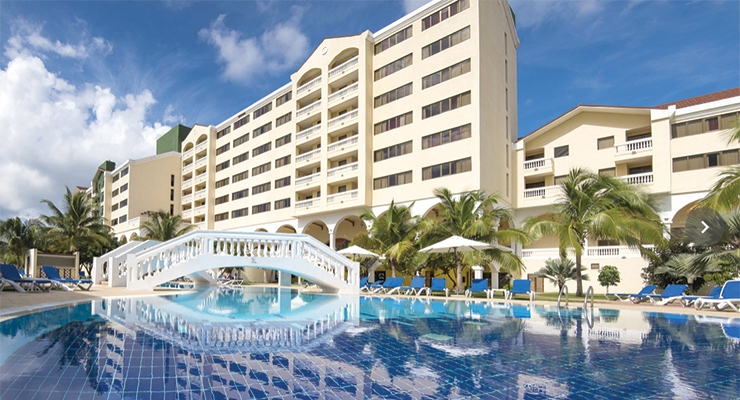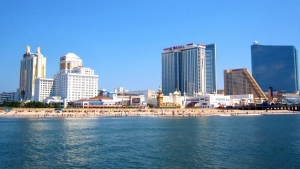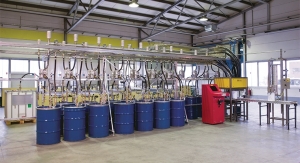Charles W. Thurston, Latin America Correspondent09.03.19
Cuba’s long-closed market has begun to open more rapidly as the tourism industry grows and brings more revenue to the island.
More than 4,000 new hotel rooms are being built this year, mostly in the capital of Havana, where there are already 15 new or refurbished hotels operating with foreign partners, reports suggest. Where monoculture agriculture failed under Fidel Castro, tourism now leads Cuba’s foreign earnings under President Miguel Diaz-Canel.
Foreign investments in Cuban tourism last year was more than $1 billion, according to reports from the state tourism agency, the Ministerio de Tourismo, or Mintur. These investments helped produce a 3.5 percent increase in Cuban tourism last year, and the government hopes for an even larger jump in tourist arrivals to five million this year.
This growth bodes well for international suppliers of hotel construction and decoration materials, including paint, coatings and a host of other goods. Since most of the investment in new Cuban hotels are coming from abroad, the acquisition of goods for the build-out also is likely to take place around the world.
While a host of countries have dived into Cuba’s tourism industry, U.S. companies are still largely hamstrung by U.S. restrictions. The Cuba embargo, in place since 1960, was tightened up a few notches earlier this year when President Donald Trump cut off the cruise industry’s access to Cuba and moved to limit U.S. remittances to the island.
U.S. court cases involving appropriation also are accelerating. For example, the Cuban government is being called to defend itself in U.S. District of Columbia federal court in a lawsuit filed by Exxon Mobil, seeking compensation for a refinery confiscated in 1960.
Title III of the U.S. Helms-Burton Act allows U.S. nationals to use U.S. courts to sue persons and entities, from the U.S. or other countries, who have invested in Cuban territory in properties nationalized after the Cuban revolution in 1959.
Despite the ongoing political storm, Mintur is signing five-year agreements with foreign hotel operators, recently including Meliá Hotels & Resorts, according to International Hotel Investment News (IHIF). One U.S. operator, Sheraton, managed to open the former Hotel Quinta Avenida in Havana as the Four Points by Sheraton Havana, in 2016, through a joint venture with Grupo de Turismo Gaviota. Sheraton has reportedly suggested that it might make additional investment in Cuba.
Among recent announcements of new hotel investment, Jose Daniel Alonso, the director of business development at Mintur, was cited by China’s state news service Xinhua, saying a Cuban-Chinese joint venture will begin next year to develop a $500 million hotel with an 18-hole golf course in Havana’s Bellomonte district. The Cuban government has said that 19 foreign companies operate two-thirds of the island’s hotels and that 27 joint ventures to build hotels and other real estate projects are underway, according to the Tampa Bay Times.
Despite the U.S. embargo on Cuba, other nations continue to invest in Cuba’s economy. Rodrigo Malmierca, Cuba’s minister of foreign trade and investment, has been widely quoted saying that Cuba has approved foreign investment commitments worth over $4.5 billion in the past two years.
While Cuba has slowly developed some industry, most of the country’s revenue is from services, including tourism and medical assistance. Although the country gains export revenues of some $4 billion a year, it imports about $15 billion, according to Wikipedia analysis. The top trading partners with Cuba are Venezuela, China, Russia, Algeria and Poland, the website calculates.
Overall, the Cuban economy is projected to grow at 0.5 percent, compared with 1.1 percent last year, according to the United Nation’s Economic Commission for Latin America and the Caribbean (ECLAC), in its 2019 economic analysis of the region. Part of the slower rate of growth is attributed to an expected decline in tourist arrivals resulting from the now tighter U.S. policy toward tourism in Cuba.
In contrast to the international tourism trade, oil development in Cuba is firmly on the rise. “Domestic oil production has tripled since 1989, so slashing by half Cuba’s nearly total dependence on imported Venezuelan crude, reported economist Pavel Vidal, in a first-quarter assessment for Cuba Standard,” wrote Mac Margolis, a Bloomberg Opinion columnist.
Many small Cuban businesses are beginning to flourish. Cuba has licensed “tens of thousands of private business, including restaurants, stores and inns, and allowed foreign providers such as European hotel operators and Airbnb,” Margolis wrote.
Since the Venezuelan economy began spiraling downward, Cuba also has sought to diversify its foreign economic relations. For example, the first Indonesian company to become active in Cuba, Archipelago International, signed a deal with Gaviota for new hotel development, according to IHIF. Most hotel investment has come from Canada, France, Spain, Switzerland and other European countries. Gaviota is the largest Cuban tourism company.
China is focusing on Cuba’s industry as well as its tourism industry. In May, Cuba began to receive shipments of 250 pieces of Chinese train equipment scheduled for delivery by the end of 2019, according to DW.com. The government has a goal of restoring the rail infrastructure in the country by 2030, including the 2,600 miles of track on the island, the news agency reported. Tourism by rail is hoped to add one million train riders this year, the agency indicated.
Cuba’s new constitution, approved in February, recognizes private property, seen as a key to attracting more foreign investment, particularly from Cuban expatriates. The country already receives about $3 billion per year in foreign remittances, according to the Miami Herald. Billions of dollars of new Cuban family transferences are expected as the private housing market opens.
Despite Trump’s efforts, U.S. tourism travel to Cuba may reopen soon. Senator Patrick Leahy (D-Vt.) introduced the Freedom for Americans to Travel to Cuba Act of 2019 in late July with the aim of ending restrictions on American travel to Cuba. Similar legislation was introduced by Reps. Jim McGovern (D-Mass.), and Tom Emmer (R-Minn.) in the House.
“Cuba represents a unique opportunity to build an economic relationship that supports a range of U.S. industry, agriculture and security interests,” Emmer said in a press statement following his bill introduction. “The U.S.’s decision to further restrict travel to Cuba undercuts efforts to help promote democracy and improve the lives of the Cuban people. American travel can do wonders for the spread of democracy, especially in Cuba. This legislation is an important step in facilitating a relationship between two nations that have much to benefit from one another,” he said.
More than 4,000 new hotel rooms are being built this year, mostly in the capital of Havana, where there are already 15 new or refurbished hotels operating with foreign partners, reports suggest. Where monoculture agriculture failed under Fidel Castro, tourism now leads Cuba’s foreign earnings under President Miguel Diaz-Canel.
Foreign investments in Cuban tourism last year was more than $1 billion, according to reports from the state tourism agency, the Ministerio de Tourismo, or Mintur. These investments helped produce a 3.5 percent increase in Cuban tourism last year, and the government hopes for an even larger jump in tourist arrivals to five million this year.
This growth bodes well for international suppliers of hotel construction and decoration materials, including paint, coatings and a host of other goods. Since most of the investment in new Cuban hotels are coming from abroad, the acquisition of goods for the build-out also is likely to take place around the world.
While a host of countries have dived into Cuba’s tourism industry, U.S. companies are still largely hamstrung by U.S. restrictions. The Cuba embargo, in place since 1960, was tightened up a few notches earlier this year when President Donald Trump cut off the cruise industry’s access to Cuba and moved to limit U.S. remittances to the island.
U.S. court cases involving appropriation also are accelerating. For example, the Cuban government is being called to defend itself in U.S. District of Columbia federal court in a lawsuit filed by Exxon Mobil, seeking compensation for a refinery confiscated in 1960.
Title III of the U.S. Helms-Burton Act allows U.S. nationals to use U.S. courts to sue persons and entities, from the U.S. or other countries, who have invested in Cuban territory in properties nationalized after the Cuban revolution in 1959.
Despite the ongoing political storm, Mintur is signing five-year agreements with foreign hotel operators, recently including Meliá Hotels & Resorts, according to International Hotel Investment News (IHIF). One U.S. operator, Sheraton, managed to open the former Hotel Quinta Avenida in Havana as the Four Points by Sheraton Havana, in 2016, through a joint venture with Grupo de Turismo Gaviota. Sheraton has reportedly suggested that it might make additional investment in Cuba.
Among recent announcements of new hotel investment, Jose Daniel Alonso, the director of business development at Mintur, was cited by China’s state news service Xinhua, saying a Cuban-Chinese joint venture will begin next year to develop a $500 million hotel with an 18-hole golf course in Havana’s Bellomonte district. The Cuban government has said that 19 foreign companies operate two-thirds of the island’s hotels and that 27 joint ventures to build hotels and other real estate projects are underway, according to the Tampa Bay Times.
Despite the U.S. embargo on Cuba, other nations continue to invest in Cuba’s economy. Rodrigo Malmierca, Cuba’s minister of foreign trade and investment, has been widely quoted saying that Cuba has approved foreign investment commitments worth over $4.5 billion in the past two years.
While Cuba has slowly developed some industry, most of the country’s revenue is from services, including tourism and medical assistance. Although the country gains export revenues of some $4 billion a year, it imports about $15 billion, according to Wikipedia analysis. The top trading partners with Cuba are Venezuela, China, Russia, Algeria and Poland, the website calculates.
Overall, the Cuban economy is projected to grow at 0.5 percent, compared with 1.1 percent last year, according to the United Nation’s Economic Commission for Latin America and the Caribbean (ECLAC), in its 2019 economic analysis of the region. Part of the slower rate of growth is attributed to an expected decline in tourist arrivals resulting from the now tighter U.S. policy toward tourism in Cuba.
In contrast to the international tourism trade, oil development in Cuba is firmly on the rise. “Domestic oil production has tripled since 1989, so slashing by half Cuba’s nearly total dependence on imported Venezuelan crude, reported economist Pavel Vidal, in a first-quarter assessment for Cuba Standard,” wrote Mac Margolis, a Bloomberg Opinion columnist.
Many small Cuban businesses are beginning to flourish. Cuba has licensed “tens of thousands of private business, including restaurants, stores and inns, and allowed foreign providers such as European hotel operators and Airbnb,” Margolis wrote.
Since the Venezuelan economy began spiraling downward, Cuba also has sought to diversify its foreign economic relations. For example, the first Indonesian company to become active in Cuba, Archipelago International, signed a deal with Gaviota for new hotel development, according to IHIF. Most hotel investment has come from Canada, France, Spain, Switzerland and other European countries. Gaviota is the largest Cuban tourism company.
China is focusing on Cuba’s industry as well as its tourism industry. In May, Cuba began to receive shipments of 250 pieces of Chinese train equipment scheduled for delivery by the end of 2019, according to DW.com. The government has a goal of restoring the rail infrastructure in the country by 2030, including the 2,600 miles of track on the island, the news agency reported. Tourism by rail is hoped to add one million train riders this year, the agency indicated.
Cuba’s new constitution, approved in February, recognizes private property, seen as a key to attracting more foreign investment, particularly from Cuban expatriates. The country already receives about $3 billion per year in foreign remittances, according to the Miami Herald. Billions of dollars of new Cuban family transferences are expected as the private housing market opens.
Despite Trump’s efforts, U.S. tourism travel to Cuba may reopen soon. Senator Patrick Leahy (D-Vt.) introduced the Freedom for Americans to Travel to Cuba Act of 2019 in late July with the aim of ending restrictions on American travel to Cuba. Similar legislation was introduced by Reps. Jim McGovern (D-Mass.), and Tom Emmer (R-Minn.) in the House.
“Cuba represents a unique opportunity to build an economic relationship that supports a range of U.S. industry, agriculture and security interests,” Emmer said in a press statement following his bill introduction. “The U.S.’s decision to further restrict travel to Cuba undercuts efforts to help promote democracy and improve the lives of the Cuban people. American travel can do wonders for the spread of democracy, especially in Cuba. This legislation is an important step in facilitating a relationship between two nations that have much to benefit from one another,” he said.
















